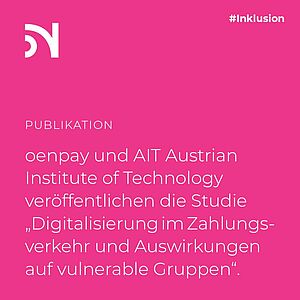The study focuses on financial inclusion as a question of social and economic sustainability and offers links to the Austrian “Barrierefreiheitsgesetz”, which will come into force in Austria in June 2025 in accordance with the European Accessibility Act.
The study shows that digital payment transactions present several barriers, particularly for vulnerable groups. The barriers mentioned include technical (e.g. complexity of the systems, lack of accessibility) as well as social (e.g. lack of support) and individual aspects (e.g. reactance and negative attitudes, lack of previous experience).
The most important results at a glance: With regard to the respective vulnerable groups analyzed, it can be seen that people with disabilities, older people and people from lower social classes in particular are to be regarded as vulnerable groups in digital payment transactions:
- There are particular risks of exclusion for people with disabilities. The higher the degree of functional impairment, the worse the usability of all the payment methods queried.
- Older people, but also younger people (financial literacy), face difficulties in dealing with digital payment technologies. There are particular risks for older people with low digital skills. The older a person is, the less often they use bank cards, payment apps and online payment services. Young adults also cite rejection and lack of interest as barriers to use.
- People from lower social classes often have to deal with poorer availability of technologies. The higher the social class, the better the availability of the internet and smartphones as well as all the payment services surveyed.
- Hardly any significant differences were found for women and non-binary people. Even for people from more rural regions, hardly any correlations between place of residence and barriers to digital payment transactions were found.
The results suggest that measures are needed to promote technical accessibility, availability, support, digital expertise and trust in banks.
The complete study is available to download free of charge from the oenpay community platform: https://community.oenpay.at
Blog on oenpay website (In German)



